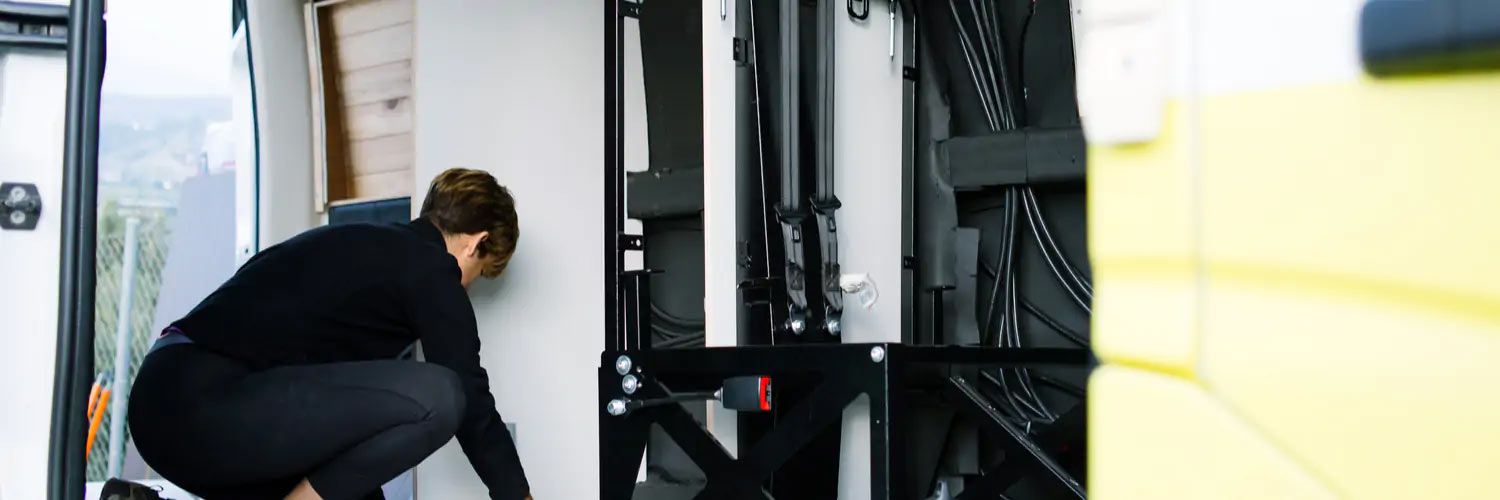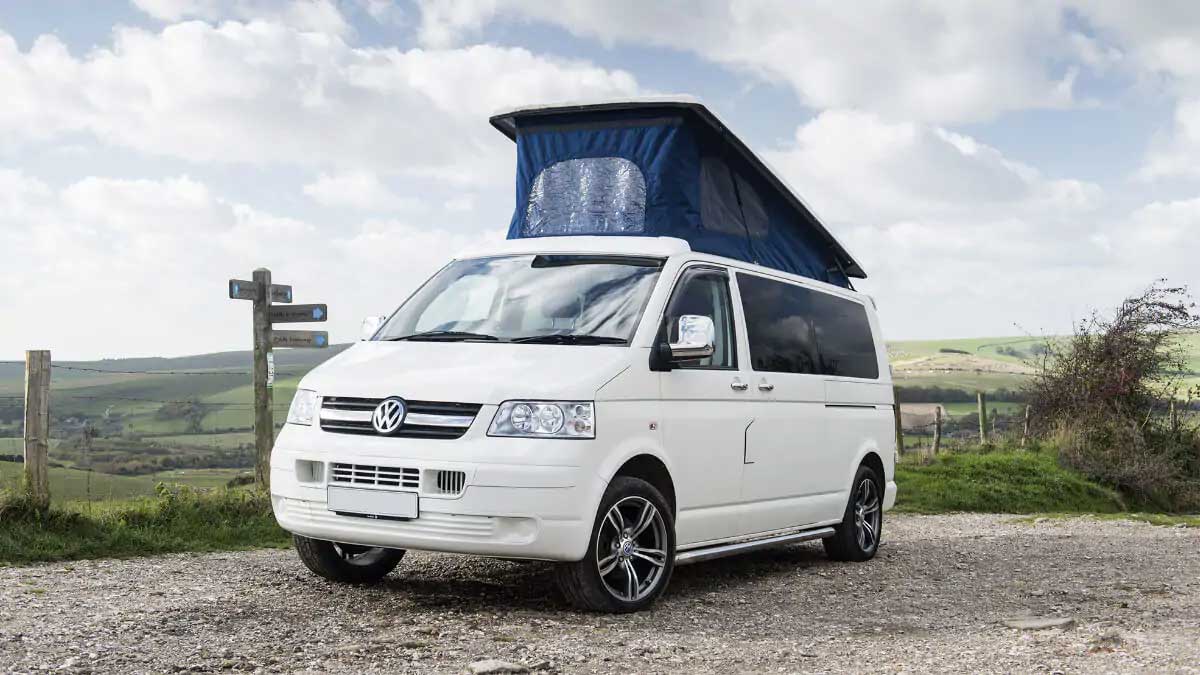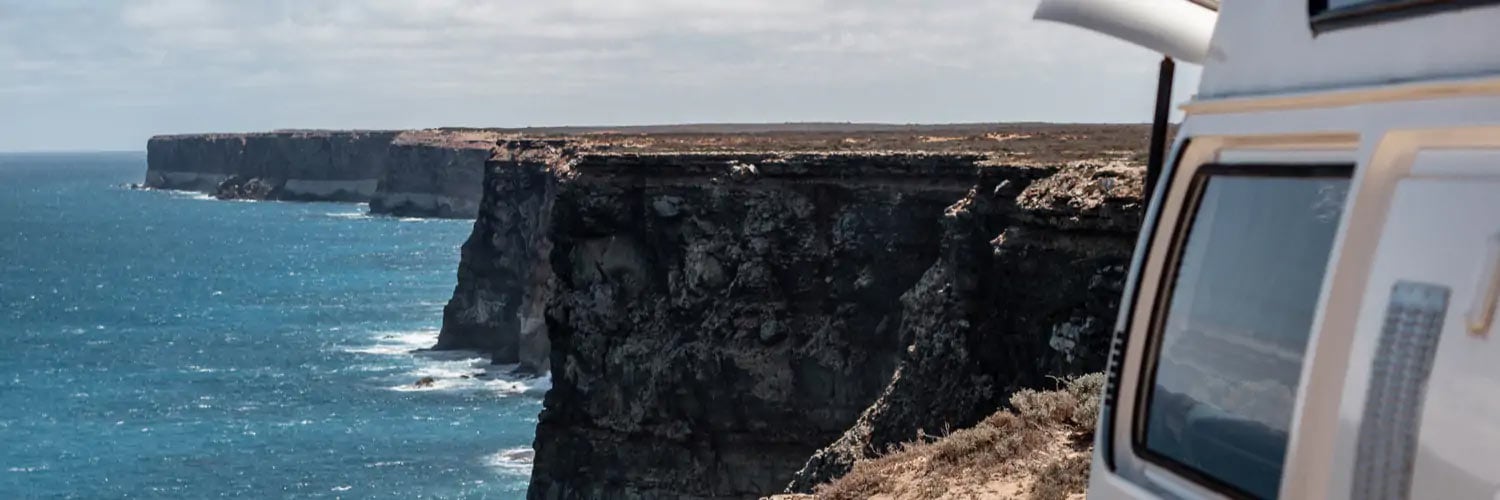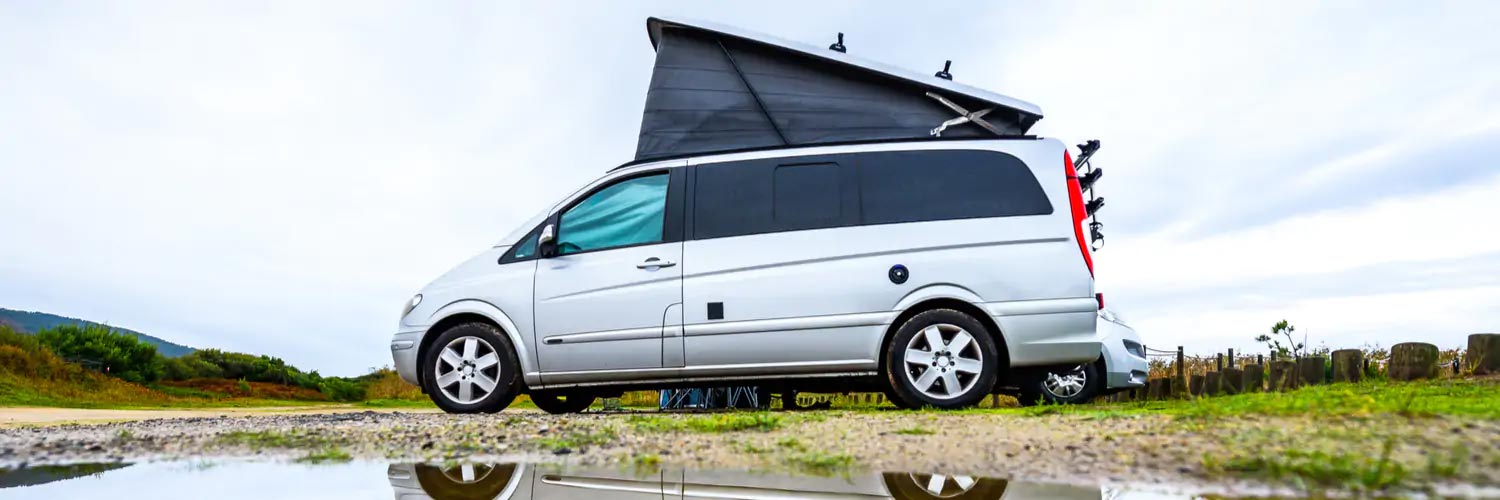What is a Campervan?
This may seem like a silly question to open with, but campervans require certain parts and appearances to classify as a campervan.
Classes of Campervan
In the UK, there are three classes of campervan, A, B and C.
- Class A: The kings of motorhomes, these are your RVs and large, luxury campervans
- Class B covers all campervans, including self or professional build and converted from a panel van.
- Class C: Standard motorhomes that are seen across the UK every summer.

DVLA (Re)Classification
The DVLA classes motorhomes and campervans as the same thing: motor caravans. Motor caravans are seen as the same thing by the DVLA, as they have the same features:
- Windows into the living area
- Separate door for access to the living accommodation
- Awning bar on the vehicle
- Seats and a bed inside the vehicle
- Cooking access
- Storage facilities
Mark from Just Kampers Insurance says :
“A large amount of the vehicles we cover are self-build campers, and we’ll always find the right policy to suit you and your vehicle. We cover the vehicle for what you tell us it is, not what the DVLA has it down on the logbook as. For example, you may have a converted van that has a rear seat/double bed, cooker, sink and fridge, but decide you don’t want side windows for security, as you want to carry high value bikes inside. Or you may have a fully converted camper with pop-top, full kitchen etc, but the logbook still says ‘van’.”
How to Get Classification as a ‘Motor Caravan’
There are three main points you need to cover to get classified as a motor caravan:
- A body type in your V5C that’s on their list
- You’ve made the required external changes to your campervan
- You’ve made the required internal changes
Once you’ve made these, and can prove your conversion should be a campervan, you need to send photo evidence to the DVLA, who can then refuse or accept your conversion.
It’s important to remember that the classification on your V5C does not impact insurance. If you use your self-build or converted van as a campervan, then you will need to insure it as a campervan, not a van.

Do I need to insure my self build van as a campervan?
Yes, you will need to insure your self-build van or converted van as a campervan. Insurers need to know about your usage of the van, rather than the outward appearance, unless it affects the performance of the van.
How do I insure my self build if my application is rejected?
To insure your self build campervan, if the DVLA has rejected your application, you’ll need to make sure you get specialist insurance. High street insurers are more likely to provide an inaccurate quote. So how do you best pick campervan insurance?
Choosing Campervan Insurance
When it comes to choosing campervan insurance, doing your research is incredibly important. You’ll need to look into:
- Underwriters and customer experience
- Policy benefits as standard and what extras are available
- What you can use the campervan for and mileage limits
- Agreed value of your camper, especially if it’s a classic or self-build
- Security discounts, such as for additional trackers or alarms
- European cover and breakdown policies
- Contents insurance for your campervan
- Gas and explosion cover
- New for old policies, if you’ve bought your campervan from new
- Transferring NCB (No Claims Bonus) from your car over
All these factors can be tailored, depending on how you use your campervan, and any modifications you may have made.
Things to Look Out for When Choosing Campervan Insurance
Customer service, reviews and underwriters
When using an insurance comparison tool, or researching potential insurers, it’s important to check existing customer experience and reviews. Defaqto often rates larger insurance companies and provides customers with an idea of what the company may be like. Sites like Trustpilot and Google also provide you with useful feedback.
With smaller independent brands, they often need underwriters to create their insurance policies, as they may not have the in-house ability to do some themselves. At Just Kampers Insurance, we use Herts Insurance Consultants to underwrite our polices, as we know they are of repute and feel they offer our customers good value.

Policy Benefits: Standard and Extras
For campervans, there will be some policy benefits that you may not see on a car policy:
- Contents cover
- Personal effects cover
- Spare parts cover
Aside from the above, the policy benefits are largely the same as a standard car policy. This doesn’t mean that a high street insurer is able to cover you, as while the benefits are the same, the nuances that campervans have, such as them being homes and cars at the same time, make high street insurers less willing to provide insurance.
Use and Mileage Limits
Many campervan policies won’t cover you for commuting purposes, simply social, domestic and pleasure. Therefore, if you are planning to commute in your campervan, it’s important you specify this to your insurer before you confirm your policy.
Mark Reynolds of Just Kampers says :
“Lots of insurers only cover campers for social and domestic use. So, if you drove it to work or to the station to commute, you’d find you’re not covered. At JK Insurance, in 99% of cases, we can tailor the policy to suit your unique circumstances, including using it for work.”
Similarly, with mileage limits, it’s important to read the small print before you agree to a policy. While you can negotiate limited mileage discounts on a policy if you’re only using it at weekends, for those who want to rack up the miles, it’s best to check this before you get a policy.

Agreed-Value Cover
Agreed-value cover of a campervan is a favoured option for those with classics, especially for those with classics, rare models and self-builds. Agreed-value cover essentially means that you can agree a value of your campers’ true worth when the policy is set, and if the worst happens, your insurer will pay out based on your agreed value rather than another valuation.
Security of your Campervan
By adding in aftermarket additions, such as an alarm or wheel lock, you may be able to secure a discount on a policy. The best motorhome security system that we recommend is the Safe-T-Pedal due to its innovative design of covering the accelerator, brake and clutch pedal assembly preventing the vehicle from being driven away when not in use.
Features Of The Saft-T-Pedal
- Made from pressed 4mm High-Grade Steel.
- Fits in seconds
- Finished in a durable powder-coated high visibility yellow finish.
- Supplied with keys
Similarly, parking it in off-season in secured campervan storage rather than your driveway can reduce premiums as it provides more security against theft. It’s important to consider your regular parking situation when you insure your campervan.

European Cover and Breakdown
While pre-Brexit, it was easier to simply drive in and out of the EU, now the insurance side is slightly different. You’ll need a green card, issued by your insurer, to drive, and specialist EU breakdown cover. Where before you may have been able to use one policy to cover you in the EU, it’s important to check the limits of your policy in the EU, especially now the six-month post-Brexit period has happened.
Contents Insurance for Campervans
Unlike a car, campervans have higher value contents, as they are like a home on wheels. Things such as TVs, gas bottles, microwaves, storage, any aftermarket additions, even accessories like awnings, all add value to your campervan contents.
Therefore, getting an appropriate amount of campervan contents insurance is key, and also valuing everything in your campervan is key. Provide your insurer with accurate information before you agree a policy, and you will get an accurate quote based on your information.
Gas and explosion cover
While this isn’t something that people might want to think about, considering the risk of any heaters, gas bottles etc, in your campervan before you get insurance will help. By accurately considering this risk, you can ensure that you are covered in case the worst, while unlikely, is considered in your insurance policy.

New for old policies
New-for-old policies is only applicable if you bought the campervan from new. It means that the insurer will replace your campervan with the most recent version of the make. There’s often specific stipulations, such as the mileage or age of campervan at point of insurance.
Transferring NCB from another policy
If you’re making your campervan your primary vehicle, then you may be able to transfer your NCB, despite it not being a like-for-like policy.
Some insurers offer this while others may only offer it if you have multi-car insurance with them. It does vary, so do check before you take out a policy.
FAQs about Campervan Insurance
How much is campervan insurance?
As every policy is custom, and campers undergo a lot of customisations, its dependent on individual circumstance and a multitude of factors! You can always get a quote to find out.
Is it cheaper to insure a van or a campervan?
Van insurance is more expensive than campervan insurance, as vans often contain more expensive contents when used as work vans. For vans, you’ll often also need business insurance as well, or one that covers you for business use, something campervans don’t need.
Can you insure a campervan as a van?
If your campervan meets the DVLA requirements for being a motor caravan, regardless of what your logbook says, you need to insure it as a campervan, if that’s what you’re using it for. This means you get appropriate cover for your use.
Can I drive a campervan on my car insurance?
No, you can’t drive a campervan on your car insurance. Your insurance needs to be appropriate for the vehicle you drive, and a campervan isn’t the same as a car. Even if you have a converted campervan, then you need to get campervan insurance, rather than relying on your car insurance.
What won’t campervan insurance cover?
Car insurance won’t cover the following:
- Infestations of rat, mice, bugs or other vermin
- Wear and tear
- Theft, if you’ve left your keys in it, windows open or door unlocked
It’s always worth giving your policy a read to check.
Do I need different insurance if I’m planning to live in my van?
No, you don’t need different insurance if you plan to live in your van. You will need to ensure you have the correct cover, such as contents insurance, and the insurer is aware you will be living in your van.
You may want to consider taking out a life or home insurance policy that covers you for van living, in case of an emergency.
Can I insure a car and campervan on the same policy?
You can only insure a car and van on the same policy if you have a multi vehicle policy. It’s important that you have the correct policy type for your needs, and that you get a bespoke policy tailored.
